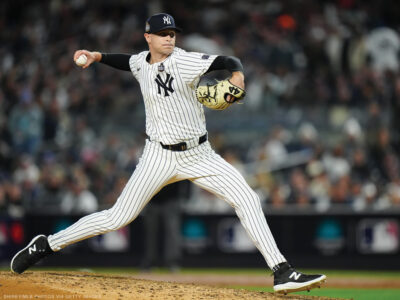Don’t miss this year’s baseball team.
By Noel Hynd
THE problem with Penn baseball, like a lot of things in life, is that the season is over just as it seems to be beginning.
Ivy League baseball usually starts in Florida in early March, then, much like the major leagues, works its way northward even before the spring weather does. That puts the Ivy season in full gear in Philadelphia on some very cool blustery days in late March and early April. It is not unheard of for a high fly ball to descend among snowflakes. By May, just when the weather is nice and the major-league seasons are starting to take on their tone for the year, the regular Ivy competition ends and playoffs begin.
Why do I mention all this? Because Ivy League baseball is enormously entertaining, and if you miss it in April or early May, you’ve missed it for the year. Head Coach Bob Seddon is entering his 29th season as the skipper of the Red and Blue varsity baseball. Under Seddon — who also successfully coached men’s soccer at Penn from 1968 until 1986 — the nineties has been a decade that featured some highly successful teams and players.
For intercollegiate baseball, the Ivy League is divided into two divisions. The Gehrig Division (named for the “Ironman” himself, who went to Columbia), includes Columbia, Cornell, Penn, and Princeton, and the Rolfe Division (named for Red Rolfe, the Yankee star of the thirties and forties, who went to Dartmouth). The Rolfe Division includes Yale, Harvard, Dartmouth, and Brown.
Each of the Ivy teams plays a 20-game conference schedule, including two double-headers (games are seven innings, not nine) against its three division rivals, plus a single twin-bill against other league members. In the case of a tie at the top of a division at the end of the season, a one-game playoff is held to determine the division champion. When division champions have been decided, the two division champs contest a three-game playoff to determine an Ivy League champion. An automatic bid to the NCAA Baseball Tournament goes to the winner.
In 1994, Penn finished first in the Gehrig Division of the Ivy League. In 1995, the team won both its division and the Ivy title, and in 1996 and 1997 the team tied for first in its division. But despite the program’s recent success — the roster includes noteworthy alumni such as Phillies centerfielder Doug Glanville, SEAS’93, Bill Wissler, C’92, Mark DeRosa, and Joe Dellicarri, C’89, all of whom are embarking on professional careers — 1998 was disappointing. Last year was the first season since 1991 that the Quakers (14-21-1) finished below second place, despite the fact that four Penn players — seniors Mark Nagata, C’98, Drew Corradini, C’98, and Joe Carlon, C’98, and sophomore Sean McDonald — were named for All Ivy status. Two significant losing streaks in April (of eight and five games, respectively) sabotaged the season, as did an earlier five-game losing streak in March. The low point: a 19-1 loss to Penn State that came one day after a 15-0 loss to Miami of Ohio.
New baseball seasons are all about renewal, however, and this year’s squad is nicely renewed. The season will start not in Florida but in California, as Penn participates in the Pepsi/Johnny Quick Classic in Fresno in March. Probable opponents will include Gonzaga, Fresno State, and Seton Hall. Returning for Penn will be All-Ivy pitcher Sean McDonald (who was 4-1 in Ivy competition last year, including a no-hitter against Cornell) and shortstop-captain Glen Ambrosius, a senior. McDonald was Penn’s most effective pitcher in 1998 and the only one with a winning record. Ambrosius hit .316 last year with eight home runs, batting in the number-two spot in the lineup. This year he will probably drop down to one of the power slots. Two other noteworthy returnees will be sophomore Jim Mullen and senior Russ Farscht. Mullen was Penn’s Rookie of the Year in 1998, hitting .327 after winning the job of starting third baseman. Farscht, who will start at first base for the third consecutive year, “slumped” to .288 last year with six home runs, after hitting .372 as a sophomore. A rebound by Farscht would greatly enhance the prospects for this year’s club.
“Pitching was one of our biggest weaknesses last year,” Coach Seddon recalled recently. “We just couldn’t get into a good rhythm.” Many of last year’s hurlers have vanished through the necessary evil of graduation. But Anthony Napolitano (a junior) and sophomores Brian Burket and Matt Hepler will be returning. In addition, three freshmen — Mark Lacerenza, Dan Fitzgerald, and Mike Mattern — figure to have good chances to amass some innings. All were outstanding high-school pitchers. Lacerenza, a southpaw, will have an especially good opportunity to move into Penn’s starting rotation, as the coach has no returning left-handers. In all, this promises to be a highly interesting — and very young — team: 18 of the 28 players currently on the roster are freshmen or sophomores. If the veterans can anchor the younger players, Penn should move back up to its normal position in the Ivy standings.
Penn’s home games are played on Bower Field, that nicely manicured diamond just behind the east end of Franklin Field and readily visible from the South Street bridge.
The field’s generous contours are particularly forgiving to pitchers. It’s 330 feet down the line in left field and 340 feet down the line to right. The fence in dead center field is a distant 410 feet away, a shot by anyone’s measurement, even in the current era of aluminum bats. But what pitchers really love is the 25 foot high fence that extends from left-center to right-center to help keep some of those metal bat specials in the park. Mother nature helps also, as the wind usually blows towards home plate. Baseball America describes Bower Field as “a pitcher’s paradise even by major league standards.” Nonetheless, the 1998 Penn team set a school team record of 48 home runs last year. Opponents answered with only 33. The weather had nothing to do with that.
Admission at Bower Field is free, and games usually draw a small but highly enthusiastic — meaning vocal — crowd. There are far worse things to do on a spring day than to catch a Penn baseball game, either at Bower or on the other Ivy fields. And what’s twice as good is catching a doubleheader. Check the schedule with the athletic office, and don’t forget to bring the picnic basket.
Noel Hynd, C’70, writes on sports for the Gazette.




